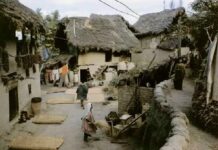
Jhelum has remained central to the identity of Kashmir, even worshipped at times. While chroniclers and hagiographers produced accounts of dynasties and warlords, the existence of Jhelum was ignored throughout.
It would have still been missing had not a soldier insulted the sensibilities of Khalid Bashir Ahmad by calling it a nadi. Instead of fighting over the status of the river, he researched the subject and produced an impressive volume – Jhelum: The River Through My Backyard, in 2001. It was only after his research was over that he came to know that people even refer the Ganges as nadi.
Deeda-e-Aab-e-Rawan, the Urdu version released recently offers a more detailed account of the river, the life on its banks and its history.
Deeda-e-Aab-e-Rawan
Author: Khalid Bashir Ahmad
Bookman Publishers, Srinagar
HB 248 pages, Rs. 550
A well researched up to date document that begins with the mythological anecdotes related to the water body it has a big dose of most modern socio-economic and demographic studies. It talks of bridges from ancient times and has made a serious effort of recreating scenes that led to collapse or destruction of some of them. It has the best chronological details about floods and the mechanisms that have evolved over the years to minimize the crises. A full fledged chapter is dedicated to the aspect of commerce associated with the river. Some of the major projects related to the river have been discussed threadbare.
Unlike Raza Ali Abidi’s Sher Darya– a travelogue surrounding the Indus, Khalid Bashir discusses river in compartments that makes it a total research work. Every word of the book has proper references.
After originating from a sleepy spring in Verinag, Jhelum roars a bit and then flows with majestic clam from Khanabal to Khadanyar and finally blasts its entry into the Kashmir that is beyond LoC. Since many spots on either bank of the river have huge historical significance, Khalid has adequately mentioned all those things.
Khalid, a poet and currently Director Information for J&K, had written the requiem of the river in a chapter that is totally dedicated to pollution and speaks volumes about the indifference the society at large is exhibiting towards it.
For obvious reasons, though, the author has stopped well before the Kaman Post skipping river’s melodious noises in utter disregard of the divisions that the LoC signifies. But the next edition of the versions should essentially add up a chapter revolving round the energy part of the water body. It essentially must offer a detailed analysis of the water-sharing agreement between India and Pakistan and its impact on Kashmir in wake of fierce debates on the subject. That will make it the ultimate document and will help it to get into the curriculum of the professional institutions that usually are more technical than routine.















